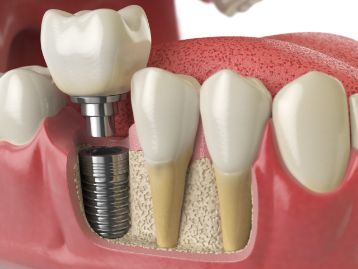
Is your implant feeling less stable than before? If so, it’s natural to feel alarmed or worried that it needs to be removed. However, the failure rate for an implant is just 2% (in non-smokers), so you can be confident in its potential to last a lifetime. Having said that, however, it’s important to act quickly to minimize the chance of failure as much as possible. Keep reading for 3 things you should do in case of a loose implant to give it the best shot at long-term success.
1. Don’t Rock Your Implant Back and Forth
It’s very important to continue keeping the area around your implant clean with good brushing and flossing habits. But, other than that, try to leave it alone and make sure you don’t rock it back and forth with your tongue. This will only serve to loosen it even more and can further damage the supportive structures around it (the gum tissue and underlying bone).
2. Schedule an Appointment as Soon as Possible
The sooner you call an implant dentist to make an appointment, the better. There are several possible reasons that an implant can become loose, and after you’ve had an exam, your dentist will know how to proceed. In some cases, it’s simply the implant restoration (e.g. the dental crown, bridge, or denture) that’s loose, which can be tightened with special tools. But if it’s the implant root itself, and it goes untreated for too long, it may be more difficult to save.
Another possibility is that the jawbone that surrounds the implant has developed a type of gum disease called peri-implantitis, causing it to deteriorate. If a dentist catches peri-implantitis early enough, it can usually be treated with improved oral hygiene habits at home, a professional cleaning, and antibiotics. If it’s not caught in time, the implant may need to be taken out to treat the area before a replacement can be done.
3. Be Careful When Chewing
Until you can be seen, be careful with what and how you chew. First, try to chew on the opposite side of your implant. It’s also a good idea to eat a softer diet and avoid tough, hard, or crunchy foods (such as nuts, tough meat, crusty bread, carrot sticks, etc.)
Keep in mind, a loose implant doesn’t necessarily mean it will fail. By seeing an implant dentist right away and following up on their recommendations, you’ll have a good chance of saving it!
About the Author
Dr. Robert J. Sanker has been an implant dentist for over 35 years and is a graduate of the Georgetown University School of Dentistry. He’s helped many people save loose dental implants with early intervention and treatment so they can continue using them for many years. If your dental implant is loose or you have any questions, he can be reached via his website.
